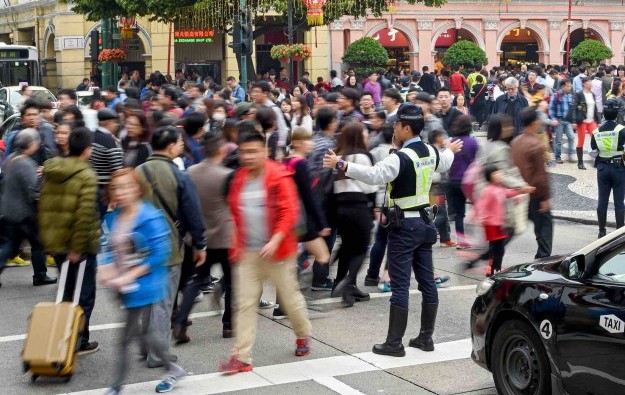Gambling warning not for Macau visitors: PRC scholar
Jun 09, 2016 Newsdesk Latest News, Macau, Top of the deck

A warning from a Chinese central government agency to the country’s citizens against ‘gambling’ while they are on holiday at home or overseas is not aimed at those gambling legally in Macau casinos, a mainland scholar who helped to draft the circular has told GGRAsia.
A caution on nine “bad behaviours” – in which Chinese tourists should avoid engaging – has been issued by the China National Tourism Administration (CNTA) and included ‘gambling’.
The CNTA notice said people found to be in violation of the conduct rules could be investigated by officials, with the possibility of facing some kind of sanction.
“What the CNTA notice has mentioned gambling being listed as one of the bad behaviours [it] is to a much larger extent referring to a warning against Chinese citizens gambling domestically on the mainland,” said Han Yuning, an academic at Beijing International Studies University, in comments to GGRAsia.
Ms Han, a regular commentator on China tourism policies, assisted in the drafting of the latest CNTA notice, she told us.
Macau is the only place in the People’s Republic of China (PRC) where casino gambling is legal.
As well as mentioning gambling, the circular also warned tourists against: prostitution; drug taking; damaging cultural relics; disorderly conduct on public transportation; unhygienic activity when in public; violating social customs; endangering themselves and others; and damaging ecological environments.
Maria Helena de Senna Fernandes, director of the Macao Government Tourism Office (MGTO), told local media on June 2, on the sidelines of a public event, that visitors gambling legally under the laws of Macau would not risk being reported to the CNTA by her organisation.
The MGTO boss said she understood the CNTA notice to be aimed mainly at developing a positive image of Chinese travellers.
Chinese-language media had mentioned the possibility of offenders under the CNTA rules having their names recorded in what was referred to as a “black book” for a period of at least a year, and a period of between three and five years if the offence involved a crime. The reports didn’t clarify what impact such blacklisting might have on the person involved.
A note on June 3 from brokerage Union Gaming Securities Asia Ltd mentioned that blacklisting could potentially be linked to a “social credit” rating system said to be in operation in China.
Such a rating system – outlined by the State Council in 2014 according to a report by Chinese news agency Xinhua in June that year – is said to seek to score citizens in four areas: administrative affairs; commercial activities; social behaviour; and interaction with the judicial system.
According to the CNTA notice, a special committee formed of government departments, legal experts, and representatives from the tourism industry would be responsible for assessing whether “bad behaviour” by an individual Chinese tourist merited that person being blacklisted and if so, for how long.
If such action were taken, it could be disclosed to the public, the CNTA notice added.
GGRAsia approached the CNTA for comment on what sanctions might be taken against Chinese tourists gambling in unlicensed and unregulated premises either at home or overseas. We had not received a reply by the time this story went online.
Related articles
-
 Macau 1H visitor tally at 16.7mln, 83...
Macau 1H visitor tally at 16.7mln, 83...Jul 16, 2024
-
 No sign casino snack topic hits tourism...
No sign casino snack topic hits tourism...Jul 05, 2024
More news
-
 Donaco EBITDA up y-o-y to above US$4mln...
Donaco EBITDA up y-o-y to above US$4mln...Jul 26, 2024
-
 HK listed Palasino upgrades Czech...
HK listed Palasino upgrades Czech...Jul 26, 2024
Latest News
Jul 26, 2024
Border-casino operator Donaco International Ltd has achieved a 164.17-percent year-on-year increase in its latest quarterly group earnings before interest, taxation, depreciation and amortisation...Sign up to our FREE Newsletter
 (Click here for more)
(Click here for more)
Pick of the Day
”We’ve got more traction outside of Macau at the moment. But Macau’s going be a bigger focus for us”
David Punter
Regional representative at Konami Australia
Most Popular
 Sheraton brand to exit Londoner Macao, to be Londoner Grand July 25, 2024
Sheraton brand to exit Londoner Macao, to be Londoner Grand July 25, 2024  Macau regulator probes unlicensed gaming agents July 24, 2024
Macau regulator probes unlicensed gaming agents July 24, 2024  Philippines gives 20k aliens in POGOs 60 days to leave July 25, 2024
Philippines gives 20k aliens in POGOs 60 days to leave July 25, 2024  Philippines-listed DigiPlus says not affected by POGO ban July 24, 2024
Philippines-listed DigiPlus says not affected by POGO ban July 24, 2024  Sands China 2Q EBITDA down q-o-q amid low hold, renovation July 25, 2024
Sands China 2Q EBITDA down q-o-q amid low hold, renovation July 25, 2024






